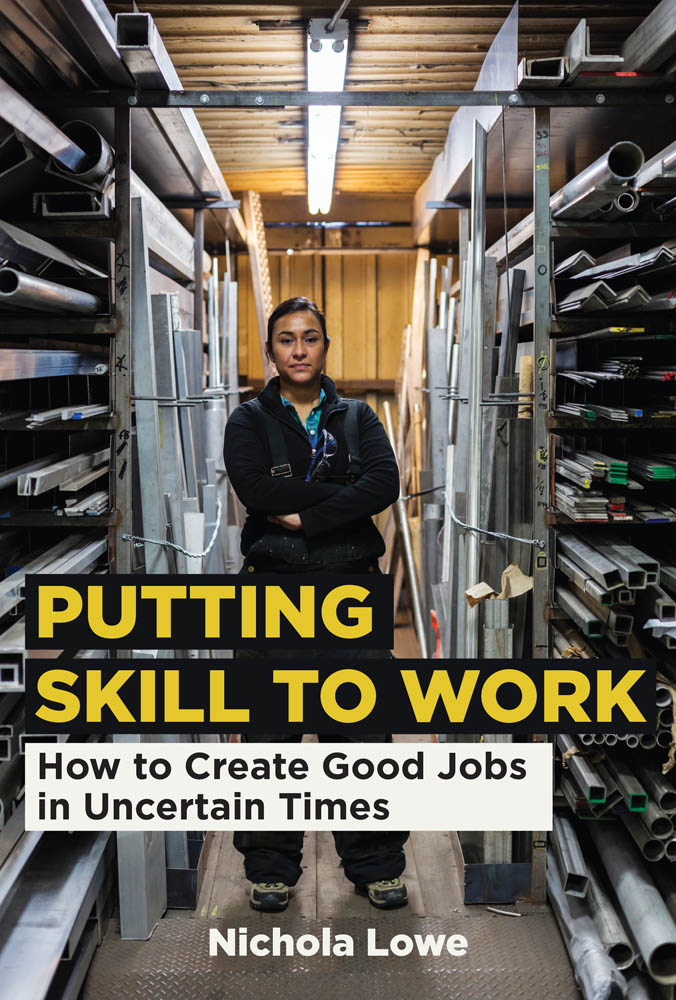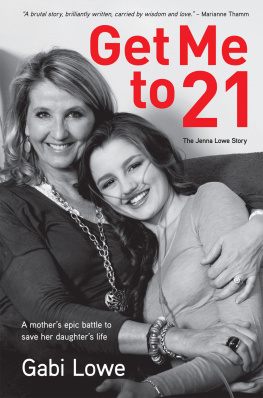Nichola Lowe - Putting Skill to Work: How to Create Good Jobs in Uncertain Times
Here you can read online Nichola Lowe - Putting Skill to Work: How to Create Good Jobs in Uncertain Times full text of the book (entire story) in english for free. Download pdf and epub, get meaning, cover and reviews about this ebook. publisher: MIT Press, genre: Politics. Description of the work, (preface) as well as reviews are available. Best literature library LitArk.com created for fans of good reading and offers a wide selection of genres:
Romance novel
Science fiction
Adventure
Detective
Science
History
Home and family
Prose
Art
Politics
Computer
Non-fiction
Religion
Business
Children
Humor
Choose a favorite category and find really read worthwhile books. Enjoy immersion in the world of imagination, feel the emotions of the characters or learn something new for yourself, make an fascinating discovery.

- Book:Putting Skill to Work: How to Create Good Jobs in Uncertain Times
- Author:
- Publisher:MIT Press
- Genre:
- Rating:3 / 5
- Favourites:Add to favourites
- Your mark:
- 60
- 1
- 2
- 3
- 4
- 5
Putting Skill to Work: How to Create Good Jobs in Uncertain Times: summary, description and annotation
We offer to read an annotation, description, summary or preface (depends on what the author of the book "Putting Skill to Work: How to Create Good Jobs in Uncertain Times" wrote himself). If you haven't found the necessary information about the book — write in the comments, we will try to find it.
Nichola Lowe: author's other books
Who wrote Putting Skill to Work: How to Create Good Jobs in Uncertain Times? Find out the surname, the name of the author of the book and a list of all author's works by series.
Putting Skill to Work: How to Create Good Jobs in Uncertain Times — read online for free the complete book (whole text) full work
Below is the text of the book, divided by pages. System saving the place of the last page read, allows you to conveniently read the book "Putting Skill to Work: How to Create Good Jobs in Uncertain Times" online for free, without having to search again every time where you left off. Put a bookmark, and you can go to the page where you finished reading at any time.
Font size:
Interval:
Bookmark:

Putting Skill to Work
How to Create Good Jobs in Uncertain Times
Nichola Lowe
The MIT Press
Cambridge, Massachusetts
London, England
2021 Massachusetts Institute of Technology
All rights reserved. No part of this book may be reproduced in any form by any electronic or mechanical means (including photocopying, recording, or information storage and retrieval) without permission in writing from the publisher.
Library of Congress Cataloging-in-Publication Data
Names: Lowe, Nichola, author.
Title: Putting skill to work : how to create good jobs in uncertain times / Nichola Lowe.
Description: Cambridge, Massachusetts : The MIT Press, [2021] | Includes bibliographical references and index.
Identifiers: LCCN 2020015013 | ISBN 9780262045162 (hardcover)
Subjects: LCSH: Employees--Training of--United States. | Employer-supported education--United States. | Skilled labor--United States. | Manpower planning--United States.
Classification: LCC HF5549.5.T7 L646 2021 | DDC 658.3/124--dc23
LC record available at https://lccn.loc.gov/2020015013
d_r0
For my son, Oskar
List of Figures
Reinterpretation around skill ambiguity benefits workers and employers.
Skill reinterpretation strategies used by workplace intermediaries (WI).
Pharmaceutical and drug-making industries, 2018: Share of workforce by educational attainment.
Source: Quarterly Workforce Indicators: Employment by educational level at all private firms. NAICS 3254. Authors analysis (data as of July 7, 2019).
Writing a bookeven one that is single-authoredis a community endeavor. Many people have supported this project, inspiring by example, seeding new ideas, encouraging me to push my writing further or knowing when to offer a supportive nod. Three women are closest to this work and were essential partners in earlier research that was further developed and integrated for this project: Mary Donegan, Laura Wolf-Powers, and Julie Stern. As co-authors of earlier papers, they encouraged me to develop the work into something larger and more encompassing. Thank you all for your brilliance, your support, and your camaraderie over the years. Working with you has been such a joy, as is watching your own big and bold projects take root. Jennifer Clark, Pierre Clavel, and John Bryson similarly opened early channels for me to put down some of my ideas in writing, ultimately allowing me to see how those loose threads might eventually come together.
This book could not have been completed without many years of conversation and collaboration with Natasha Iskander, my close friend and my comrade in skills investigation. We both set an ambitious target of writing single-authored books around the same time, knowing they would also help us extend the insights we had gained from our earlier hidden talent collaboration. I have learned much from our work together over the years, especially how to theorize while I write, but equally the power of building a story around the voices of those living and innovating good work. But even more exciting than finishing our respective books at roughly the same time is the recent launch of our newest research adventure together, this time exploring an ever more existential challenge to humanity: climate and work.
Many of the foundational ideas for this book were born twenty years ago when I was a graduate student at MIT. While my dissertation research had very little to do with the topic of workforce skill, the courses I took with MIT faculty in urban studies, economics, and political science laid the conceptual foundations for studying workforce skill and connecting intermediation to broader processes of institution building and change. Paul Osterman helped me recognize both the power of labor market institutions and the need to continually document how and under what conditions those institutions evolve to (re)gain power, even while others are forced to retreat. Michael Piore introduced me to the concepts of interpretation and ambiguity, inspiring much of the books conceptual framework. From Alice Amsden I learned to value the state, but also to consider the underlying processes of influence and engagement on which the capacity to govern is really based. Frank Levy, now my neighbor and fellow Durham walker, has helped me prepare for counterarguments and caveats. Judith Tendler taught me that writing is power, but to achieve it means editing, over and over and over again. And before all of them, Martin Kenney inspired me to research.
Numerous graduate research assistants and students have contributed to this work over the years, including Austin Amandolia, Peter Cvelich, Allison Forbes, Allan Freyer, Carolyn Fryberger, Marcela Gonzales, Brady Gordon, Jamaal Green, Jessica Pearlman, Hilary Pollan, and Tim Quinn, among others. My former student Cara Isher-Witt has been involved the entire duration, helping with early research and, more recently, acting as my trusted copyeditor and writing cheerleader, ensuring I sharpened the prose, clarified what was less obvious, and tempered my tendency (or, as we like to call it, my superpower) to be typo-blind. Peter Wissoker carried me through the book proposal process and convinced me I had a book. Marc Doussard did the most careful of reviews, helping me see both the weak spots and the powerful messages that needed further amplification. I also thank six anonymous reviewers who offered constructive feedback at various stages of book development. Emily Taber at MIT Press added further editing skills to the mix, ensuring a meaningful and enjoyable book writing experience throughout.
Many other economic development researchers and practitioners, as well as colleagues at the University of North Carolina, have cheered me on over the years and helped me cross the finish line: Greg Schrock, Meenu Tewari, Bill Lester, Noreen McDonald, Maryann Feldman, Jesse White, Ferrel Guillory, Peter Coclanis, John Quinterno, Tom White, Mac McCorkle, Nancey Green Leigh, Liz Reynolds, Helen Lawton Smith, Susan Christopherson, Amy Glasmeier, Ranita Jain, Maureen Conway, Amy Blair, Bill Bullock, John Balchunas, Erica Staley, Janice Goldman, David Wolfe, Rachel Willis, Joan Fitzgerald, Bjorn Asheim, Bill Rohe, Michele Berger, Mark Katz, Eric Downing, and Todd Owen. I especially thank Emil Malizia and Harvey Goldstein, my economic development mentors during my time at UNC, for their continued support and guidance, as well as the UNC Office of the Provost for generously providing me with a funded leave to focus exclusively on this book. Close friends and neighborsSumila, Kristina, Cheri, Tara, Tania, Melinda, Maggie, Cynthia, Marcus, Debbie, Paul, Karen, Nina, Darrel, Cassy, Travis, Robin, Henry, Judy, Sally, Paul, Tristan, Charleslet me share bits of my evolving thinking over good food and drink and provided me with much-needed social sustenance and head-clearing breaks.
Above all, I thank my family for nurturing my mental endurance. My sister and my father anticipated many of the questions that needed to be answered throughout this processand my mother asked the most, always cheering me on while playing the role of the foil in our ongoing debate around technology and work. James, my ever-patient and ever-engaged husband, shared weekly articles and resources in support of my argument, but also knew when I needed to hear the perspective of an informed contrarian, a skill he learned well from Hendrika and Elizabeth, both at the ready, along with Subir, to help sharpen thinking through good, progressive debate. Charles Umbanhowar, Jamess father, is not with us now to read the final product, but he was there at the start when I first proposed to write a skill-focused book and helped me realize early on the importance of a clear and unambiguous title. And my son, Oskarto whom I dedicate this, my first bookhelps remind me every single day what can be gained for our family and our society from being part of a learning community that is broad-reaching, inclusive, and diverse.
Font size:
Interval:
Bookmark:
Similar books «Putting Skill to Work: How to Create Good Jobs in Uncertain Times»
Look at similar books to Putting Skill to Work: How to Create Good Jobs in Uncertain Times. We have selected literature similar in name and meaning in the hope of providing readers with more options to find new, interesting, not yet read works.
Discussion, reviews of the book Putting Skill to Work: How to Create Good Jobs in Uncertain Times and just readers' own opinions. Leave your comments, write what you think about the work, its meaning or the main characters. Specify what exactly you liked and what you didn't like, and why you think so.










